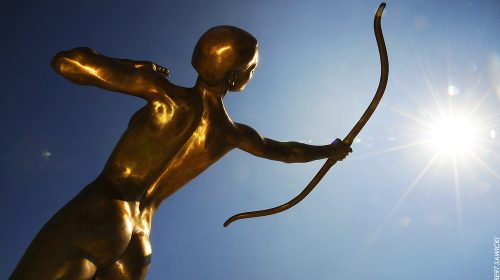Leonard Pietraszak was born in 1936 in Bydgoszcz. He is one of the most-popular film, stage and television actors in Poland. His most-famous roles include Colonel Krzysztof Dowgird in a swashbuckler series entitled Czarne chmury/Black Clouds (1973), directed by Andrzej Konic, and Dr. Karol Stelmach, a very good friend of the protagonist, Engineer Karwowski, in the iconic series entitled Czterdziestolatek/A Forty-Year-Old, by Jerzy Gruza. He studied chemistry at the Nicolaus Copernicus University in Toruń.
He stated in various interviews that he had taken his first steps in acting in Bydgoszcz.
He abandoned his studies at the NCU and started to work at the Ruch company. In the meantime, he attended classes at a theatre centre, taught by the actors from the theatre in Bydgoszcz. It was they who encouraged Pietraszak to apply to the acting school in Łódź. In the second half of the 1950s, he started studying at the Acting Department of the Leon Schiller State Higher School of Film, Television and Theatre in Łódź, and graduated in 1960.
1959 saw his stage debut at the Nowy Theatre in Łódź, in Nie-Boska komedia/Non-Devine Comedy, directed by Bohdan Korzeniowski. Pietraszak also performed at the Dramatyczny Theatre in Poznań, the Komedia Theatre, the Ateneum Theatre and many more, and also played several-dozen roles at the Television Theatre.
His screen debut was a bit part in Prawdziwy koniec wielkiej wojny/The Real End of the Great War by Jerzy Kawalerowicz. In the late 1950s and early 1960s, he appeared in a number of popular comedy films, such as Awantura o Basię/Argument About Basia (1959) and Szatan z siódmej klasy/The Devil from Seventh Grade (1960) by Maria Kaniewska, Cafe pod Minogą/Octopus Cafe (1959) by Bronisław Brok and Zezowate szczęście/Bad Luck (1960) by Andrzej Munk. In 1961, he played his first more-serious role and portrayed Hipolit Gronczewski, a young actor from a provincial troupe in Komedianty/Comedians by Maria Kaniewska.
Pietraszak worked with the most-renowned Polish Directors, such as Jan Łomnicki, Andrzej Wajda, Wojciech Marczewski and Kazimierz Kutz.
He started to enjoy immense popularity after starring in the television series Stawka większa niż życie/More Than Life at Stake (1968) and Gniewko, syn rybaka/Gniewko, a Fisherman’s Son (1969). In 1973, he played the leading role in the first Polish swashbuckler series entitled Czarne chmury/Black Clouds. He became famous for his bravado performance as the character of Colonel Krzysztof Dowgird, who fought to keep the 17th-Century Duchy of Prussia within Polish borders. The series was directed by Andrzej Konic. One year later, Pietraszak joined the cast of Czterdziestolatek/A Forty-Year-Old, a television series directed by Jerzy Gruza, in which he played Dr. Karol Stelmach, a friend of the eponymous forty-year old, Engineer Karwowski. He reprised the role of Stelmach in the feature-length cinema version of Czterdziestolatek/A Forty-Year-Old, a comedy film entitled Motylem jestem, czyli romans 40-latka/I’m a Butterfly, created in 1976. He played the character of Stelmach for the third time in 1993, in a television series entitled 40-latek, 20 lat później/A Forty-Year-Old, 20 Years Later (1993), also directed by Jerzy Gruza.
In 1970s and 1980s, Pietraszak starred in numerous television series, such as Rodzina Połanieckich/The Połanieccy Family, Kariera Nikodema Dyzmy/The Career of Nikodem Dyzma and Królowa Bona/Queen Bona Sforza. Interestingly, he reprised his character of Marshal Piotr Kmita from Królowa Bona/Queen Bona Sforza two years later, in Epitafium dla Barbary Radziwiłłówny/An Epitaph for Barbara Radziwiłł by Janusz Majewski.
He created the outstanding and unforgettable portrayal of Gustaw Kramer, a banker, in the brilliant Directorial debut of Juliusz Machulski entitled Vabank/Va Banque. In this film, the character played by Pietraszak says the iconic line “Ucho od śledzia!” (lit. “The herring’s ear!”, meaning something impossible to do), a phrase which became permanently embedded in everyday Polish language.
A sequel entitled Vabank II, czyli riposta/Va Banque II, was made in 1984. Pietraszak also starred in another excellent comedy directed by Machulski, entitled Kingsajz/King Size.
Moreover, he appeared in a number of pictures by Andrzej Wajda – Danton, where he played Lazare Carnot, Wszystko na sprzedaż/Everything for Sale (a bit part) and Kronika wypadków miłosnych/The Chronicle of Amorous Accidents where he played the father of the protagonist, Alina, portrayed by Paulina Młynarska.
In the 1990s, Pietraszak appeared in films directed by Janusz Majewski, such as Siedlisko/The Dwelling Place and Złoto dezerterów/Deserters’ Gold. Between 2006 and 2009, he played bit parts in television series: 39 i pół/39 and a Half and Codzienna 2 m. 3/2 Codzienna Street, apt. 3. After 1998, he decided to no longer appear in front of cameras and focus on his stage performances and career instead. Pietraszak is a lover of Polish painting and a well-known art collector.
Selected filmography
- 1957 – „Prawdziwy koniec wielkiej wojny”/„The Real End of the Great War” dir. Jerzy Kawalerowicz
- 1959 – „Cafe pod Minogą”/„Octopus Cafe” dir. Bronisław Brok
- 1959 – „Awantura o Basię”/„Argument About Basia” dir. Maria Kaniewska
- 1961 – „Komedianty”/„Comedians” dir. Maria Kaniewska
- 1968 – „Stawka większa niż życie”/„More Than Life at Stake” dir. Janusz Morgenstern, Andrzej Konic (TV series)
- 1971 – „Perła w koronie”/„Pearl in the Crown” dir. Kazimierz Kutz
- 1973 – „Czarne chmury”/„Black Clouds” dir. Andrzej Konic (TV series)
- 1974–1977 – „Czterdziestolatek”/„A Forty-Year-Old” dir. Jerzy Gruza (TV series)
- 1978 – „Rodzina Połanieckich”/„The Połanieccy Family” dir. Jan Rybkowski (TV series)
- 1981 – „Vabank”/„Va Banque” dir. Juliusz Machulski
- 1982 – „Danton” dir. Andrzej Wajda
- 1984 – „Vabank II, czyli riposta”/„Va Banque II” dir. Juliusz Machulski
- 1987 – „Kingsajz”/„King Size” dir. Juliusz Machulski
- 1993 – „40-latek. 20 lat później”/„A Forty-Year-Old, 20 Years Later” dir. Jerzy Gruza, Adam Iwiński
- 1998 – „Złoto dezerterów”/„Deserters’ Gold” dir. Janusz Majewski
- 2011 – „Listy do M.”/„Letters to Santa” dir. Mitja Okorn
- 2012 – „Dzień kobiet”/„Women’s Day” dir. Maria Sadowska
Selected awards and distinctions
The Officer’s Cross of the Order of Polonia Restituta; the award of the Head of the Committee of Radio and Television for lifetime television achievements; Distinguished Cultural Service Award; Gold Medal for Merit to Culture – Gloria Artis, and others.


